Lead Engineers are at the heart of project development and innovation. They coordinate the technical aspects of projects and lead engineering teams, ensuring that all pieces come together smoothly and efficiently.
The role requires a mix of technical expertise, including deep knowledge in their specific engineering field, and soft skills such as leadership and project management. Assessing these skills effectively is key to identifying the right candidate for the role.
Candidates can write these abilities in their resumes, but you can’t verify them without on-the-job Lead Engineer skill tests.
In this post, we will explore 9 essential Lead Engineer skills, 11 secondary skills and how to assess them so you can make informed hiring decisions.
Table of contents
9 fundamental Lead Engineer skills and traits
The best skills for Lead Engineers include System Design, Coding Proficiency, Problem Solving, Technical Mentorship, Project Management, Code Review, DevOps Knowledge, Security Awareness and Database Management.
Let’s dive into the details by examining the 9 essential skills of a Lead Engineer.
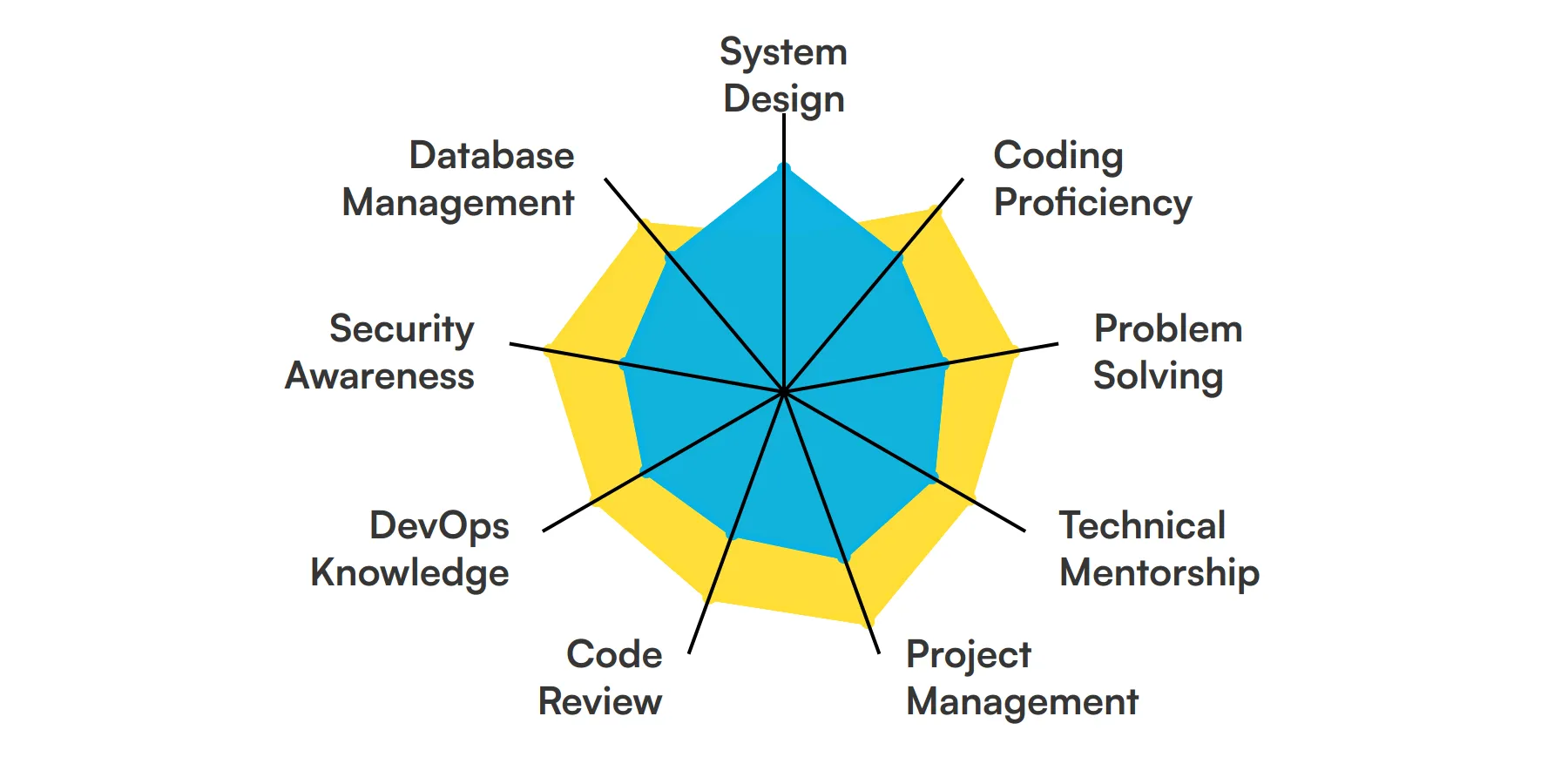
System Design
A lead engineer must excel in system design, creating scalable and efficient architectures. This skill is crucial for planning and implementing complex systems that can handle growth and adapt to changing requirements.
For more insights, check out our guide to writing a System Analyst Job Description.
Coding Proficiency
Strong coding skills are a must for a lead engineer. They need to write clean, maintainable code and guide the team in best practices. This ensures the software is reliable and easy to update.
Problem Solving
Lead engineers often face challenging technical issues. Their ability to quickly identify problems and devise effective solutions is key to keeping projects on track and maintaining system integrity.
Check out our guide for a comprehensive list of interview questions.
Technical Mentorship
Providing guidance and support to junior engineers is a significant part of a lead engineer's role. This involves sharing knowledge, reviewing code, and helping team members grow their skills.
Project Management
Managing timelines, resources, and deliverables is essential for a lead engineer. They need to ensure that projects are completed on time and within budget while meeting quality standards.
For more insights, check out our guide to writing a Project Manager Job Description.
Code Review
Conducting thorough code reviews is a critical responsibility. A lead engineer must ensure that the codebase remains clean, efficient, and free of bugs, which helps maintain high standards across the team.
DevOps Knowledge
Understanding DevOps practices is important for a lead engineer. This includes automating deployments, monitoring systems, and ensuring continuous integration and delivery, which helps streamline development processes.
Check out our guide for a comprehensive list of interview questions.
Security Awareness
A lead engineer must be aware of security best practices to protect systems from vulnerabilities. This involves implementing secure coding practices and staying updated on the latest security threats.
Database Management
Managing and optimizing databases is a key skill. A lead engineer needs to design efficient database schemas, write optimized queries, and ensure data integrity and performance.
For more insights, check out our guide to writing a Database Administrator (DBA) Job Description.
11 secondary Lead Engineer skills and traits
The best skills for Lead Engineers include API Development, Testing Frameworks, Cloud Services, Version Control, Containerization, Performance Tuning, UI/UX Principles, Networking Basics, Agile Methodologies, Documentation and Cross-Platform Development.
Let’s dive into the details by examining the 11 secondary skills of a Lead Engineer.
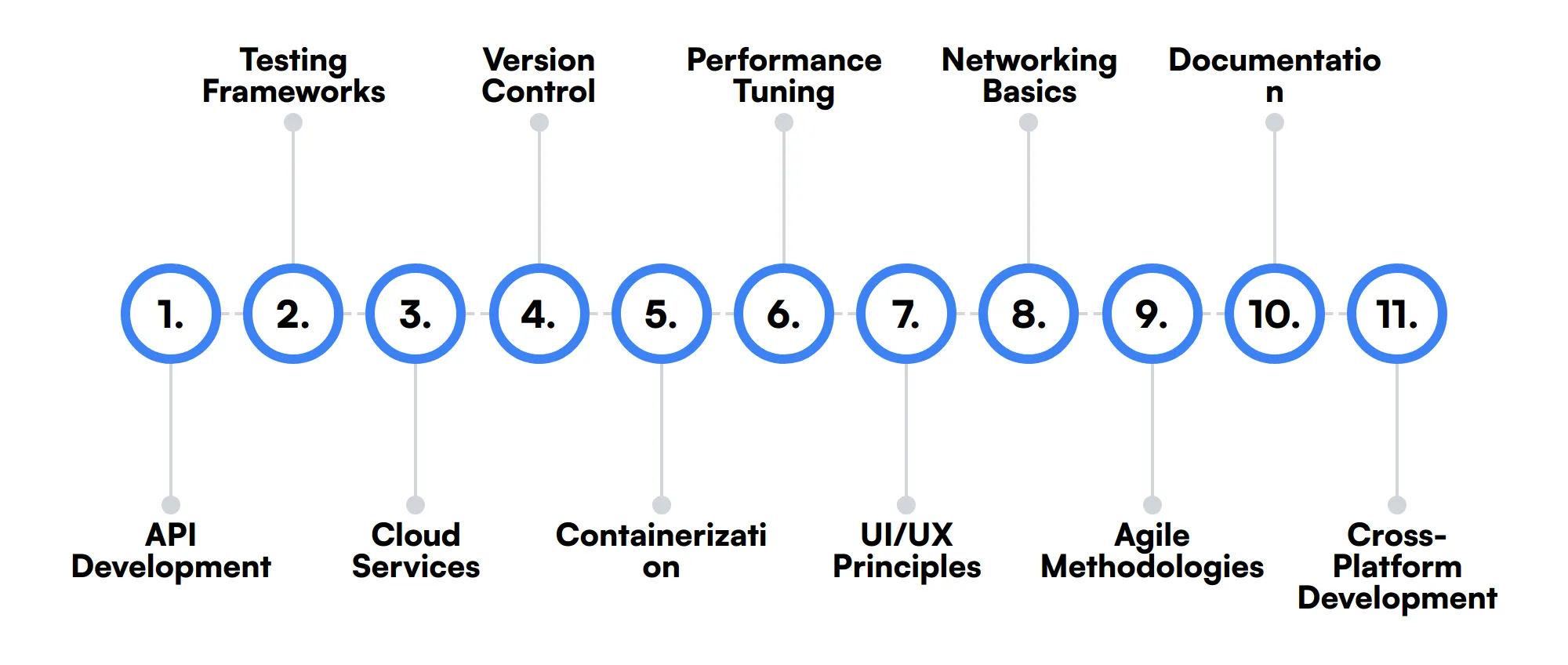
API Development
Creating and maintaining APIs is a valuable skill. This involves designing endpoints, ensuring they are well-documented, and maintaining backward compatibility.
Testing Frameworks
Knowledge of testing frameworks helps in writing unit, integration, and end-to-end tests. This ensures that the software is reliable and reduces the likelihood of bugs.
Cloud Services
Familiarity with cloud services like AWS, Azure, or Google Cloud is beneficial. This includes deploying applications, managing resources, and leveraging cloud-based tools.
Version Control
Proficiency with version control systems like Git is important. This skill helps in managing code changes, collaborating with team members, and maintaining a history of project development.
Containerization
Understanding containerization tools like Docker and Kubernetes is useful. This allows for consistent environments across development, testing, and production.
Performance Tuning
Optimizing the performance of applications is a valuable skill. This involves profiling code, identifying bottlenecks, and implementing improvements to enhance speed and efficiency.
UI/UX Principles
Basic knowledge of UI/UX principles can be helpful. This ensures that the software not only functions well but also provides a good user experience.
Networking Basics
Understanding the basics of networking can aid in troubleshooting connectivity issues and optimizing network performance for applications.
Agile Methodologies
Familiarity with Agile methodologies helps in managing projects more effectively. This includes practices like Scrum or Kanban, which promote iterative development and continuous improvement.
Documentation
Good documentation skills are important for maintaining clear and comprehensive project records. This helps in onboarding new team members and ensuring that knowledge is easily accessible.
Cross-Platform Development
Experience with cross-platform development can be beneficial. This involves creating applications that run smoothly on multiple operating systems and devices.
How to assess Lead Engineer skills and traits
Assessing the skills and traits of a Lead Engineer involves a detailed understanding of their technical and leadership capabilities. It's not just about knowing the tools and technologies; it's about understanding how they apply these in real-world scenarios.
While resumes may highlight a candidate's experience and certifications, they fall short of showcasing how effectively they can manage a team, drive a project to completion, or innovate under pressure. This is where practical assessments come into play.
Lead Engineers must excel in areas like System Design, Coding Proficiency, and Problem Solving. They also need to be adept at Technical Mentorship, Project Management, and more. To accurately evaluate these skills, consider using structured assessments that simulate real-world challenges.
For a comprehensive evaluation, Adaface assessments offer a tailored approach to testing a wide range of engineering skills. These tests help you understand not only the technical skills but also how well a candidate fits into the team dynamic, potentially improving the quality of your hires.
Let’s look at how to assess Lead Engineer skills with these 6 talent assessments.
System Design Online Test
Our System Design Online Test evaluates candidates on their ability to design scalable and efficient software systems. It covers a broad range of topics from database design to cloud computing.
The test assesses candidates' skills in creating high-level design specifications, choosing appropriate architectures, and optimizing system performance. It also evaluates their understanding of microservices architecture and distributed systems.
Successful candidates demonstrate a strong ability to handle complex system integration and ensure security and quality in software design.
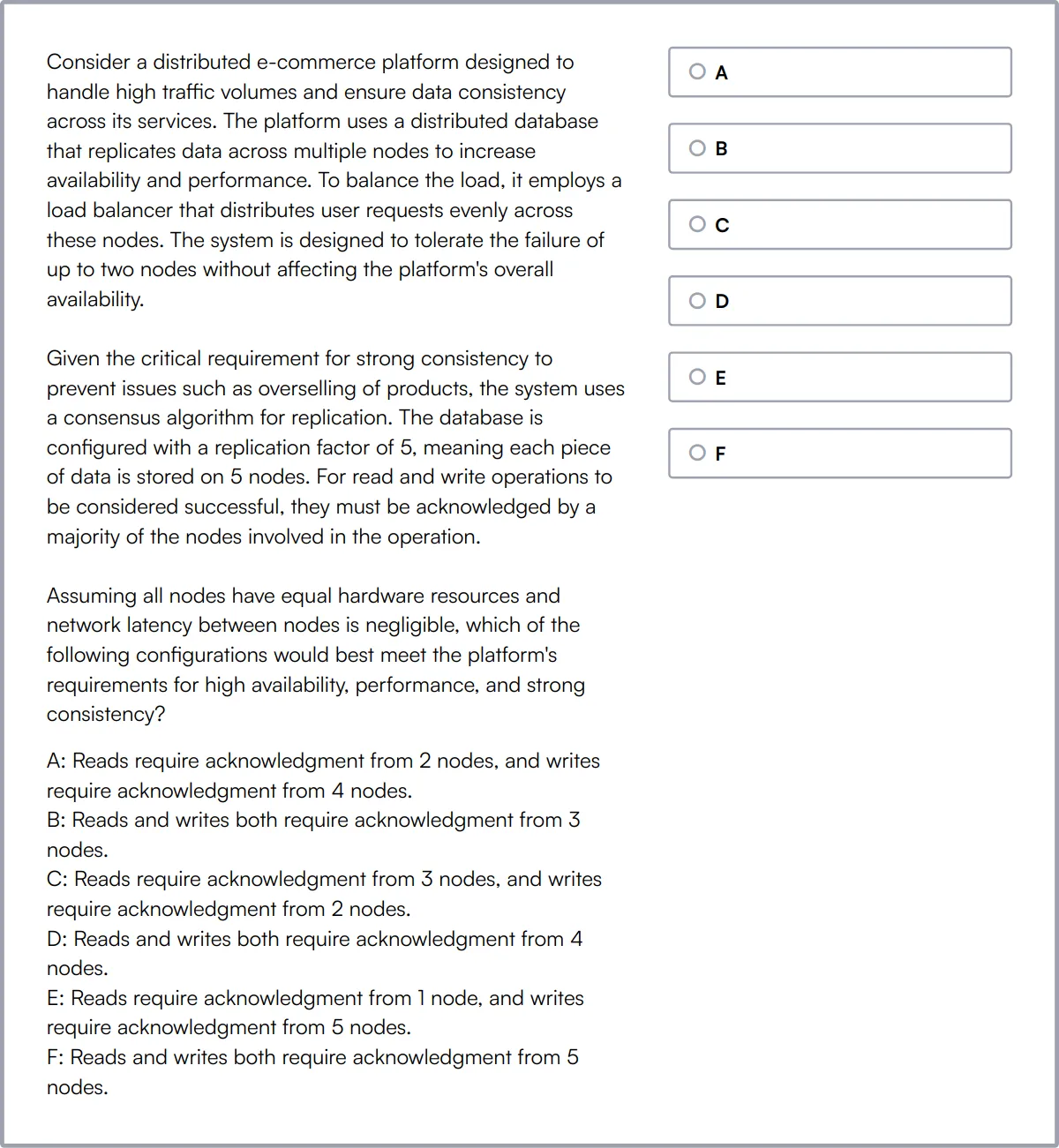
Computer Programmer Coding Aptitude Test
Our Computer Programmer Coding Aptitude Test measures a candidate's problem-solving skills using programming concepts and logic. It includes questions on data structures and algorithm basics.
This test challenges candidates to analyze problems, identify patterns, and develop solutions using programming logic. It assesses their ability to write functional code using various programming languages.
High-scoring candidates are proficient in applying programming fundamentals to solve complex problems, demonstrating a strong coding aptitude.
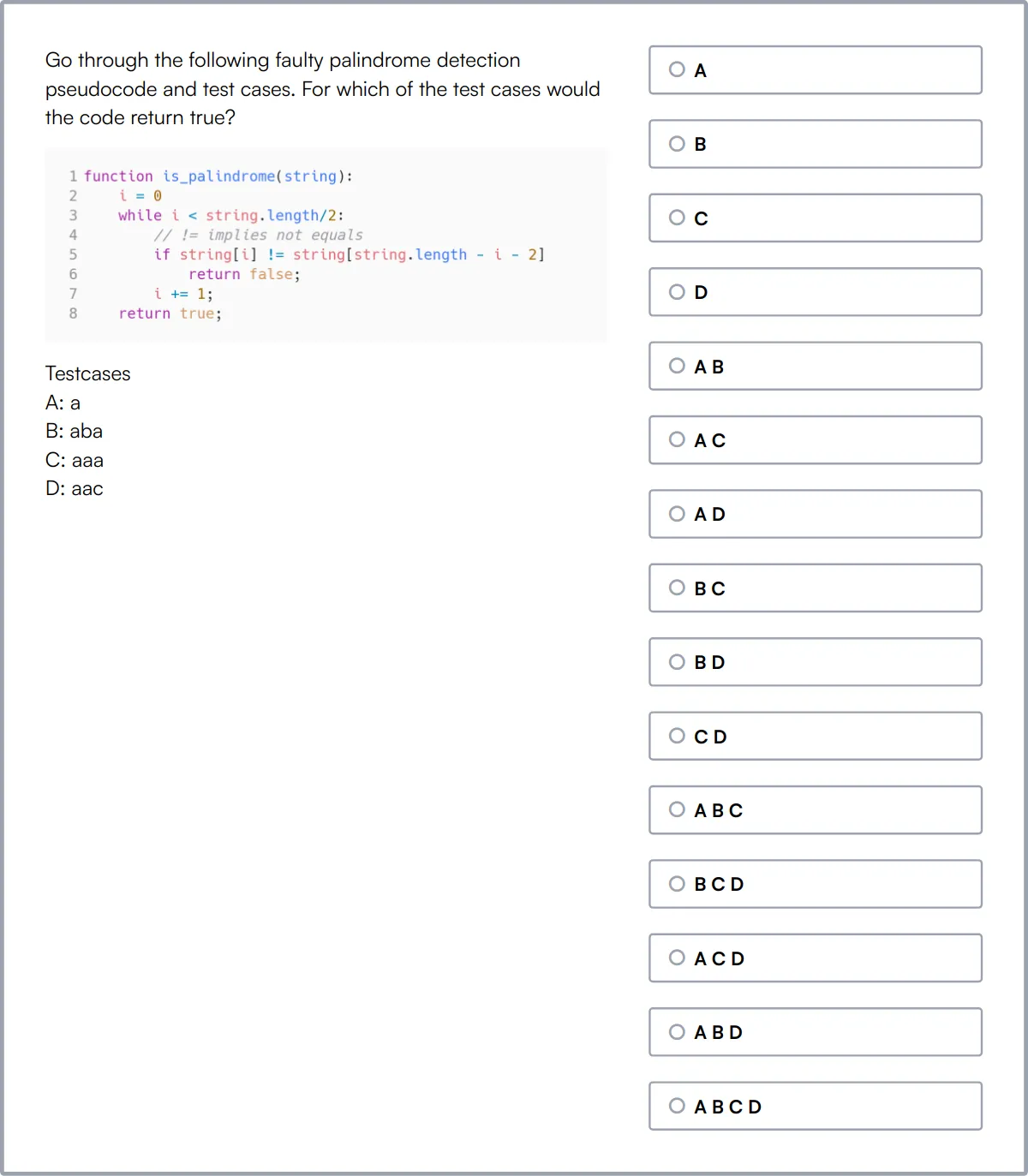
Problem Solving Test
Our Problem Solving Test assesses a candidate's ability to analyze data and respond to complex situations using logical and critical thinking.
The test evaluates abstract reasoning, spatial reasoning, and pattern matching skills. It provides insights into the candidate's deductive and inductive reasoning abilities.
Candidates who perform well on this test show a strong capacity for critical thinking and effective problem-solving strategies.
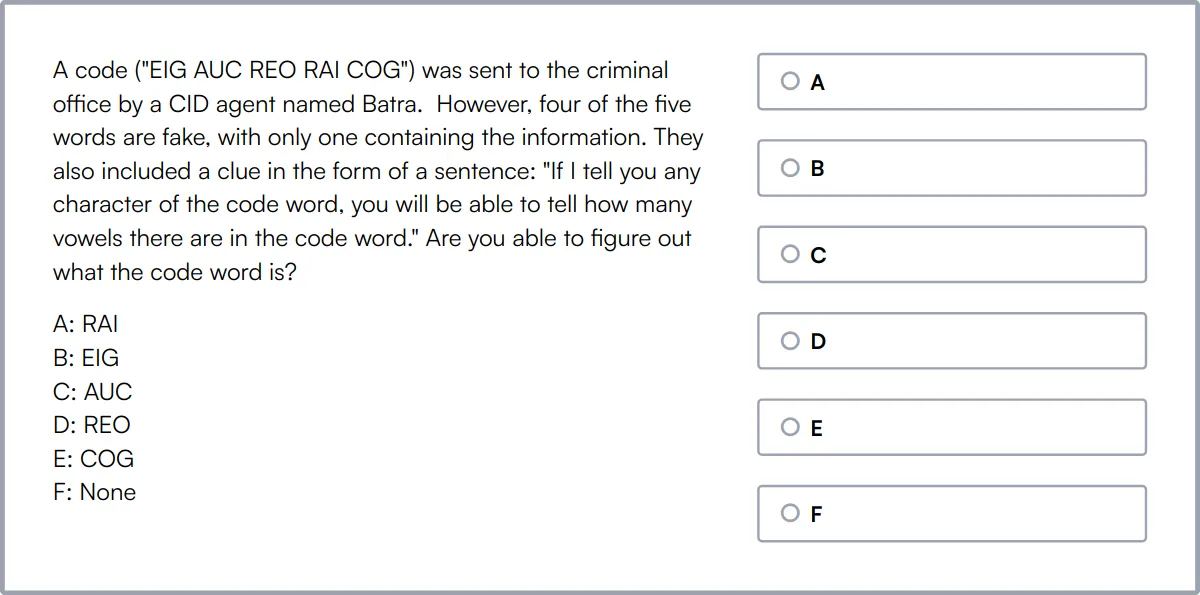
Project Management Test
Our Project Management Test assesses a candidate's ability to plan and execute projects efficiently, covering everything from cost estimation to stakeholder management.
The test evaluates candidates on their understanding of project roles, stages, and risk analysis. It also tests their skills in agile and traditional project management methodologies.
Candidates who excel in this test demonstrate a comprehensive understanding of project management principles and the ability to handle complex project scenarios.
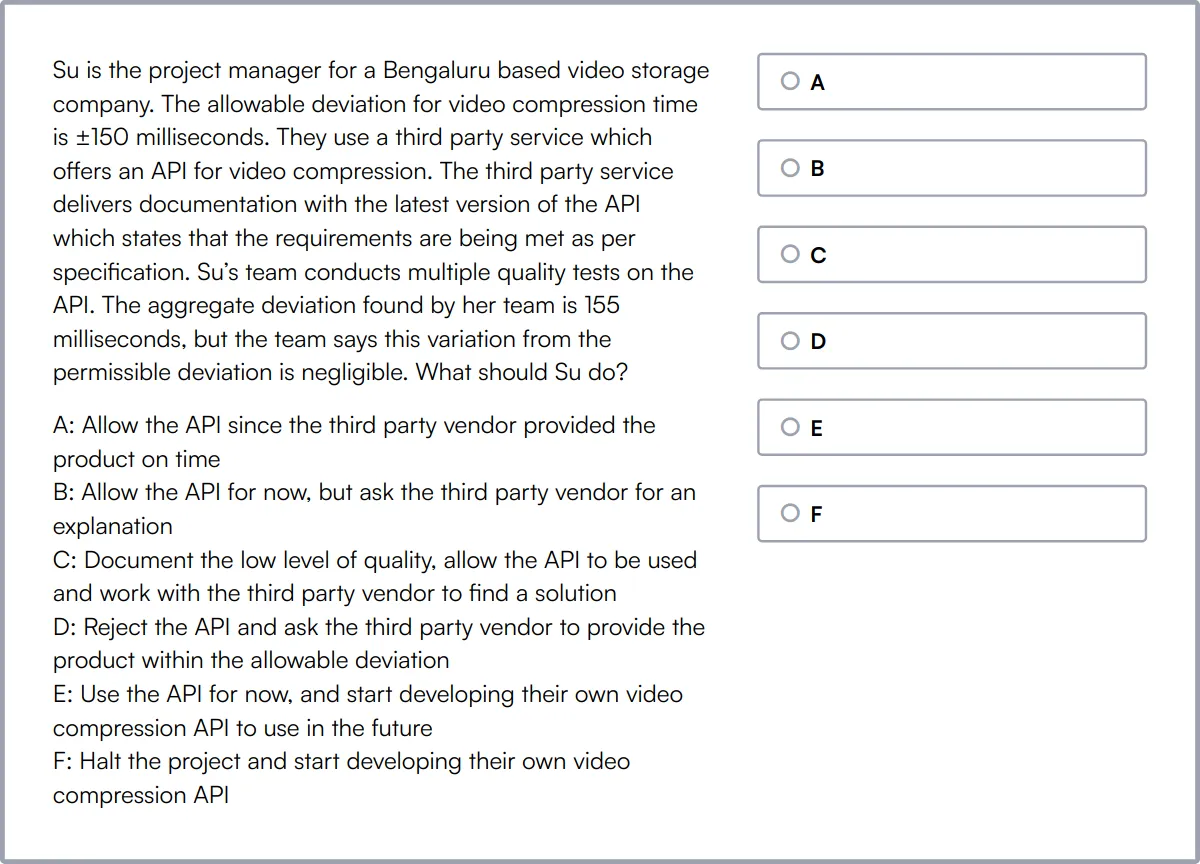
DevOps Test
Our DevOps Test is designed to evaluate a candidate's proficiency in key DevOps practices and tools such as Git, Docker, and Linux.
This test assesses candidates on their skills in managing Docker containers, using Git workflows, and scripting with Python. It also covers file system management and basic DevOps principles.
Successful candidates will have a solid grasp of DevOps techniques and the ability to apply these skills in real-world scenarios.
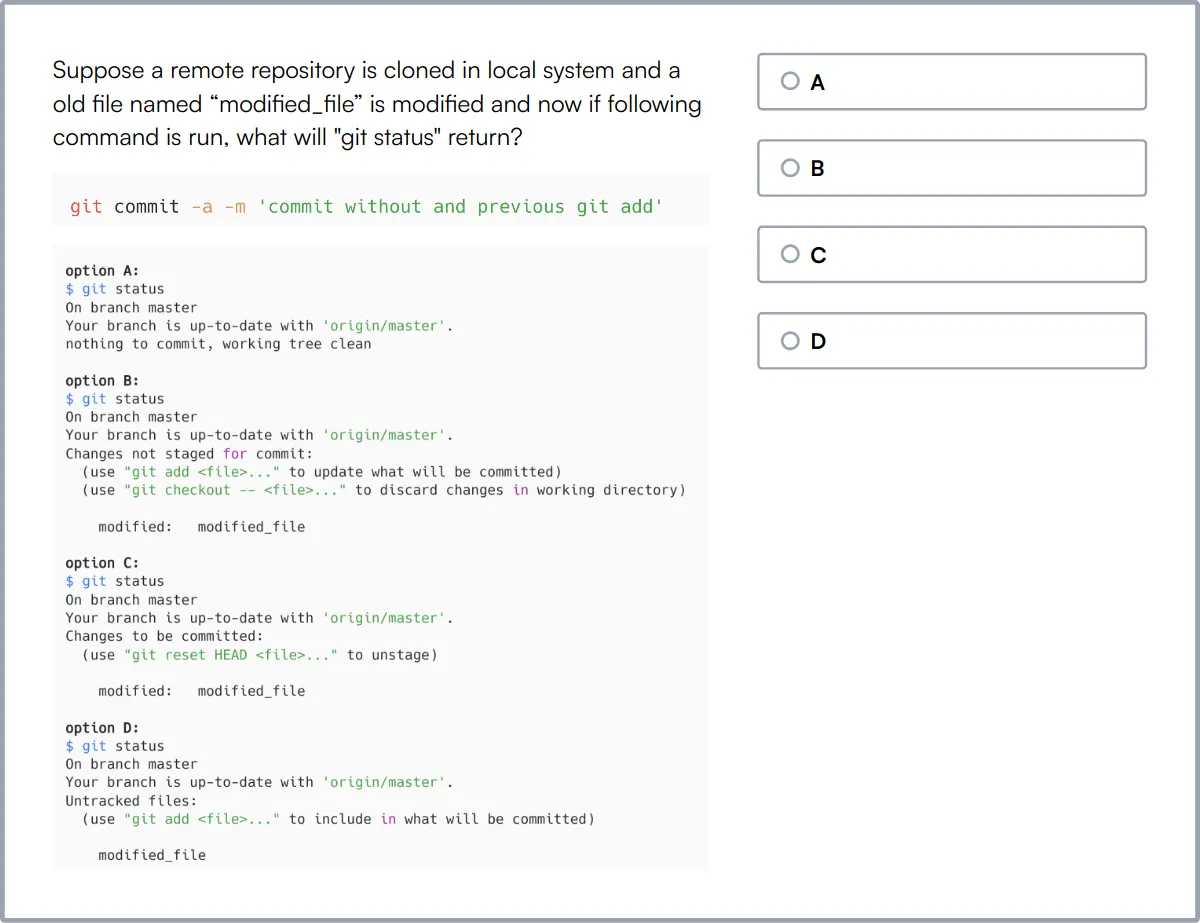
Cyber Security Assessment Test
Our Cyber Security Assessment Test evaluates candidates on their knowledge of network security, cyber attacks, and cryptography, ensuring they can protect systems against threats.
The test challenges candidates' understanding of web security, email security, and data governance. It assesses their ability to perform risk assessments and network tests.
Candidates who score well are proficient in detecting and mitigating security risks, demonstrating a strong foundation in cybersecurity defenses.
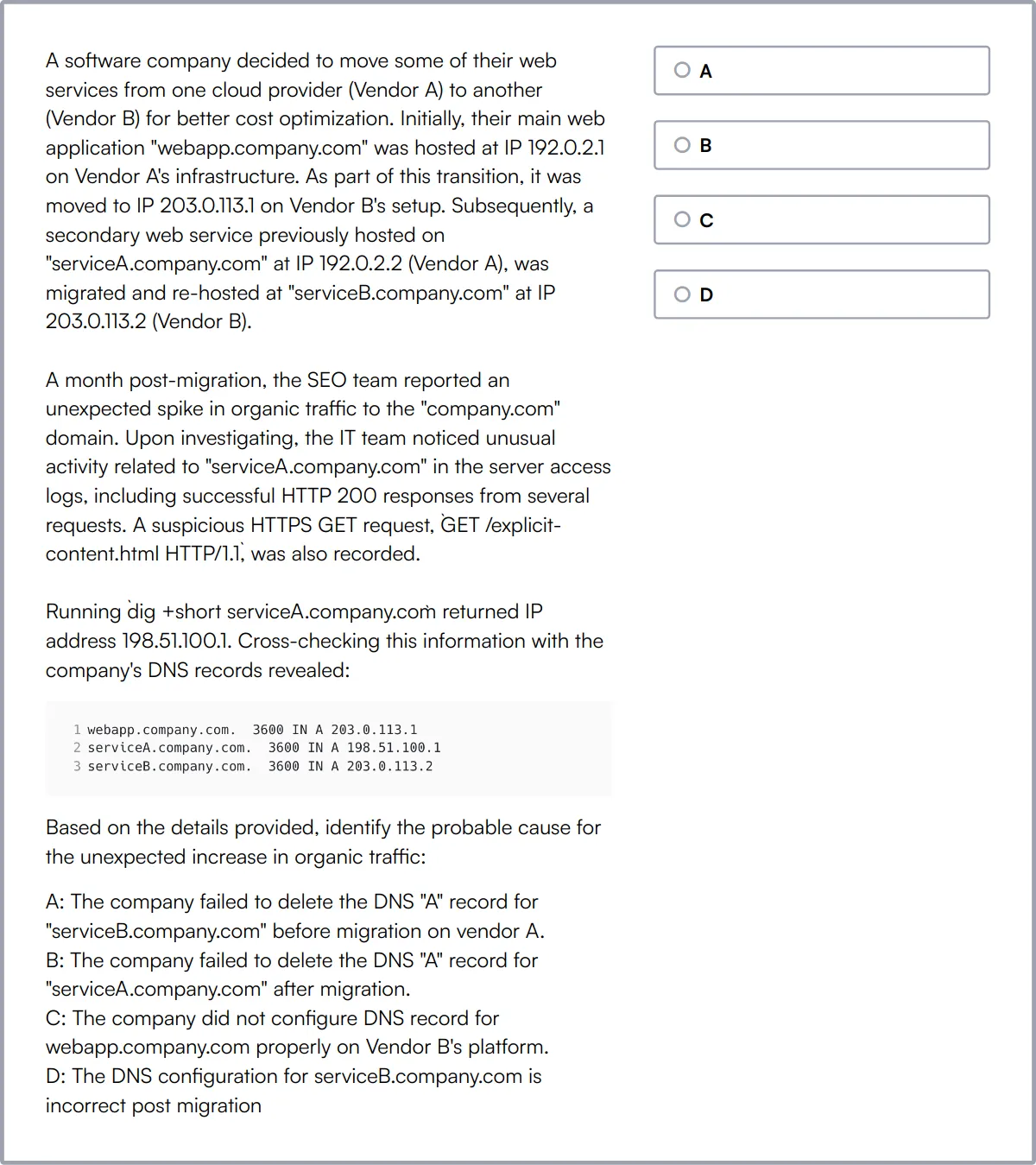
Summary: The 9 key Lead Engineer skills and how to test for them
| Lead Engineer skill | How to assess them |
|---|---|
| 1. System Design | Evaluate the ability to architect scalable and maintainable systems. |
| 2. Coding Proficiency | Assess the quality and efficiency of written code. |
| 3. Problem Solving | Measure the approach to identifying and resolving complex issues. |
| 4. Technical Mentorship | Gauge the capability to guide and develop junior engineers. |
| 5. Project Management | Check skills in planning, executing, and delivering projects on time. |
| 6. Code Review | Evaluate the ability to provide constructive feedback on code. |
| 7. DevOps Knowledge | Assess understanding of deployment, monitoring, and infrastructure management. |
| 8. Security Awareness | Measure knowledge of best practices for securing applications and data. |
| 9. Database Management | Evaluate skills in designing, querying, and optimizing databases. |
QA Engineer Test
Lead Engineer skills FAQs
What are the key skills to look for in a Lead Engineer?
Key skills include System Design, Coding Proficiency, Problem Solving, Technical Mentorship, and Project Management. These skills ensure the engineer can lead projects and teams effectively.
How can I assess a candidate's System Design skills?
Ask candidates to design a system during the interview. Evaluate their ability to break down complex problems, choose appropriate technologies, and create scalable architectures.
What is the best way to evaluate Coding Proficiency?
Use coding challenges or pair programming sessions. Look for clean, efficient code and the ability to solve problems quickly and accurately.
Why is Technical Mentorship important for a Lead Engineer?
Technical Mentorship ensures that junior engineers grow and improve. It also fosters a collaborative environment and helps in knowledge sharing within the team.
How do you assess Project Management skills in a Lead Engineer?
Discuss past projects and their management. Look for experience in planning, resource allocation, risk management, and meeting deadlines.
What should I look for in a Code Review process?
Assess the candidate's ability to provide constructive feedback, identify potential issues, and suggest improvements. This ensures code quality and team growth.
How important is DevOps Knowledge for a Lead Engineer?
DevOps Knowledge is important for continuous integration and deployment. It ensures smooth operations and quick delivery of software updates.
What role does Security Awareness play in a Lead Engineer's responsibilities?
Security Awareness is crucial for protecting data and systems. A Lead Engineer should be able to identify vulnerabilities and implement security best practices.

40 min skill tests.
No trick questions.
Accurate shortlisting.
We make it easy for you to find the best candidates in your pipeline with a 40 min skills test.
Try for freeRelated posts
Free resources



